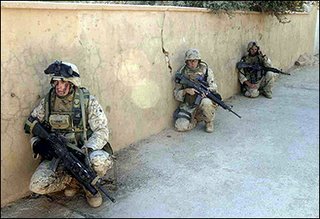
With nearly three years left in office, the president’s
policies and popularity are
sinking fast.
WASHINGTON Mar 10, 2006 (AP)— More
and more people, particularly Republicans,
disapprove of President Bush's performance,
question his character and no longer consider
him a strong leader against terrorism,
according to an AP-Ipsos poll documenting
one of the bleakest points of his presidency.
Nearly four out of five Americans, including
70 percent of Republicans, believe civil war
will break out in Iraq the bloody hot spot
upon which Bush has staked his presidency.
Nearly 70 percent of people say the U.S. is on
the wrong track, a 6-point jump since
February.
"Obviously, it's the winter of our discontent,"
said Rep. Tom Cole, R-Okla.
Republican Party leaders said the survey
explains why GOP lawmakers are rushing to
distance themselves from Bush on a range of
issues port security, immigration, spending,
warrantless eavesdropping and trade, for
example.
The positioning is most intense among
Republicans facing election in November and
those considering 2008 presidential
campaigns.
Today’s NY Times has more tasty quotes from the
circular firing squad of Republicans now surrounding the
president:
There's a lot of frustration here — we've had
a run of real bad luck," said Tom Rath, a New
Hampshire Republican leader. "You've got
such longevity in that White House team that
they are tired. They need a break. They need
a big piece of good luck. I don't know what it
is."
James H. Herring, the chairman of the
Mississippi Republican Party, said, "They need
to minimize these self-inflicted wounds."
Senator Lindsey Graham of South Carolina
said of Mr. Bush: "He's right about Social
Security. He's right about the big things of his
time. Executing has been a problem.
Implementing has been a problem."
Of course, when you’re the head of the executive
branch, an inability to “excecute” might be a significant
problem -- one that requires more than “a big piece of
good luck” to fix. Republicans outside the Bush Bubble
have been aware of this for some time. Hence the ever
growing list of conservative
authors,
bloggers and
pundits running for the hills to get as far away from
Bush’s disastrous policies as possible.
Basically, when
William F. Buckley and
Bill O'Reilly both
agree that the Iraq War is a failure, no amount of
spinning from Rumsfeld or Cheney is going to help.
And when your own party ignores your veto threat and
puts the kibosh on your big, international business deal
-- citing national security concerns -- it might be time to
start using a new playbook.
From the above NY Times article:
Several Republicans here said Mr. Bush
urgently needed to shake up his staff. Senator
Norm Coleman, Republican of Minnesota,
pointed to what he described as a series of
management and political failures as he urged
Mr. Bush to bring in a new team.
"There is some question about whether those
around him have served him well," Mr.
Coleman said. "This president has strong
support in the United States Senate — in
many ways, a lot of our fates are tied to him.
We want him to be popular, we want the
public to support him. But there have been
problems."
Quack! Quack!









